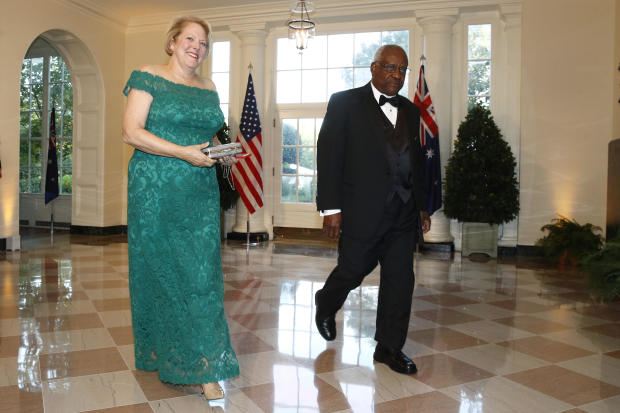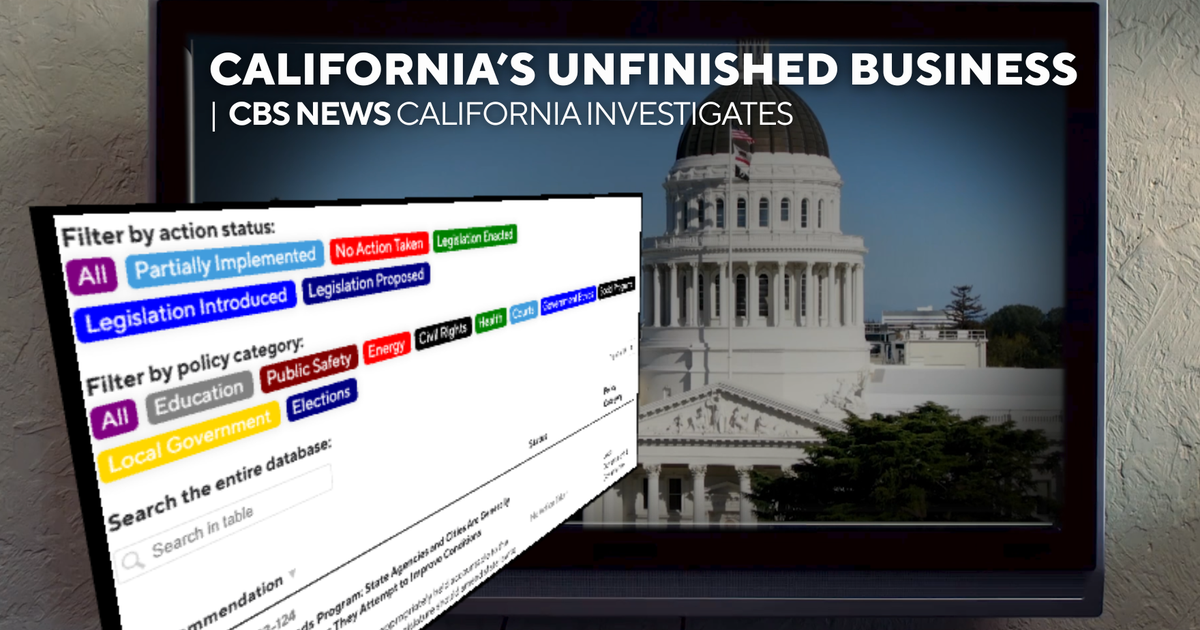Appetite grows on Capitol Hill for code of conduct for Supreme Court justices after Ginni Thomas revelations
Washington — Momentum on Capitol Hill is building behind a congressional response to revelations that Virginia "Ginni" Thomas pushed former White House chief of staff Mark Meadows to pursue efforts to overturn the results of the 2020 presidential election, with lawmakers arguing the communications between the two underscore the need for a code of conduct for Supreme Court justices.
Legislation that would require the crafting of a set of ethics standards for members of the nation's highest court has been introduced in each Congress since 2011, according to Gabe Roth, executive director of Fix the Court, an organization that advocates for more judicial transparency and accountability. But there is growing enthusiasm from Democrats in both chambers to take up a measure that would ensure justices have to adhere to a binding code to ensure impartiality and transparency.
"This is a big domestic issue, losing the trust of one of the nine Supreme Court justices, and it's something I think that has broken through," Roth told CBS News. "There hasn't been something comparable on a judicial ethics scale in a very long time, so now is the time to capture that moment. It's not just the Justice Thomas issue where the ethics are lacking, but now is the time to do it, and I think Democrats are huddling. But there should be hearings, it should be a sustained effort, and pressure's got to mount."
A congressional aide told CBS News that Democratic Sen. Chris Murphy's office is working to gain more cosponsors for his bill, the Supreme Court Ethics Act, which would require the Judicial Conference of the United States to create a code of ethical conduct for Supreme Court justices and federal court judges.
The proposal, a version of which has been introduced in the House by Democratic Rep. Hank Johnson of Georgia, has support from the chairs of the House and Senate Judiciary Committees, but has not yet received any Republican backing. While the plan would likely win approval from the Democrat-controlled House, it faces a more difficult path in the Senate, where support from at least 10 Republicans would be needed for it to advance.
"It's going to be a challenge in the Senate," Roth said. "My hope is that this push, for cosponsors and hearings in the House and Senate, will be enough to compel Chief Justice Roberts to work on an ethics code. This is definitely a lot more momentum than we've seen in the past."
In remarks on the Senate floor in support of his bill Thursday, Murphy called it "unacceptable" there is no binding code of conduct and no clear standards of recusal for members of the Supreme Court.
"I think my Democratic and Republican colleagues can agree on this: the American people deserve to know that our Supreme Court justices are being held to the highest standards, whether they be justices appointed by Democratic presidents or justices appointed by Republican presidents," he said. "It's not enough for us to just trust the Court any longer to self-enforce a secret, internal code of ethics. The highest court in the land cannot be exempt from the standards we hold every other federal judge to."
Senate Majority Leader Chuck Schumer told reporters Tuesday that he believes there should be "some kind of code of conduct" for Supreme Court justices, while Senate Judiciary Committee Chairman Dick Durbin said a formal set of ethics rules for high court members is "long overdue."
First on the agenda for the judiciary panel, though, is the confirmation of Judge Ketanji Brown Jackson to the Supreme Court, Durbin, an Illinois Democrat, said.
"It's a matter of concern," he told reporters of a code of conduct for the justices. "But it's going to be a concern taken up after the Easter recess."
House Speaker Nancy Pelosi, meanwhile, said Thursday she wants the House to move a standalone bill requiring a code of ethics on the Supreme Court.
"If your wife is an admitted and proud contributor to a coup of our country, maybe you should weigh that in your ethical standards," she said, a reference to Ginni Thomas.
But Senate Minority Leader Mitch McConnell accused Democrats of attempting to "nullify the presence of Justice Thomas on the court" by calling for his recusal and expressed confidence in his impartiality.
"This performative outrage is not in earnest. This is a political hit, part of liberals' years long quest to delegitimize the court, all because our laws and constitution occasionally inconvenience the Democrats' radical agenda," McConnell said in remarks on the Senate floor Wednesday.
Still, the appetite on Capitol Hill to create a code of conduct for members of the Supreme Court has grown this week following revelations by CBS News and the Washington Post that Ginni Thomas, wife of Justice Clarence Thomas, exchanged 29 text messages with Meadows in the weeks following the 2020 presidential election and as President Trump ramped up efforts to subvert the transfer of power by claiming the election was rife with voter fraud.
In one of the messages, Ginni Thomas claimed Democrats were perpetrating "the Greatest Heist of our History" and in others, she encouraged Meadows to pursue efforts to reverse the outcome of the election. She also referenced unfounded theories circulating online claiming that the election was stolen.
Ginni Thomas's messages came during a period over which Mr. Trump and his allies pledged to ask the Supreme Court to toss out electoral votes from key battleground states. The high court declined to intervene in a slew of disputes filed by Republican officials in the wake of the 2020 presidential election. After the high court spurned a pair of legal challenges to Pennsylvania's election rules mounted by Trump's allies, Thomas, along with Justices Samuel Alito and Neil Gorsuch, said they would have heard the cases.
In a dissent, Thomas called the decision by the Supreme Court "baffling" and said it invites "further confusion and erosion of voter confidence."
Trump also asked the Supreme Court in late 2021 to intervene in a court battle against the House select committee investigating the January 6 assault on the U.S. Capitol, which requested reams of his White House records related to the events of January 6. But in January, the high court declined to block the release of the documents. Only Thomas said he would have granted Trump's request to withhold the records, though he did not provide an explanation.
Thomas's involvement in the cases has come under scrutiny, and Democrats have called on him to recuse himself from future disputes that come before the Supreme Court involving the January 6 attack.
"I do think he should recuse himself," Schumer said. "The information we know right now raises serious questions about how close Justice Thomas and his wife were to the planning and execution of the insurrection."
Sen. Elizabeth Warren, a Democrat from Massachusetts, and Rep. Pramila Jayapal, a Democrat from Washington, spearheaded a letter with 22 other Senate and House Democrats calling on Thomas to recuse himself from future cases involving the January 6 insurrection and explain why he declined to step aside from proceedings involving the 2020 election and attack.
The bicameral group of Democrats also asked Chief Justice John Roberts to commit no later than April 28 to creating a code of conduct for the Supreme Court.
"[G]iven the recent disclosures about Ms. Thomas's efforts to overturn the election and her specific communications with White House officials about doing so, Justice Thomas's participation in cases involving the 2020 election and the January 6th attack is exceedingly difficult to reconcile with federal ethics requirements," they wrote to Thomas and Roberts.
While there is a code of conduct for federal judges, which was adopted by the Judicial Conference in 1973, it does not cover members of the Supreme Court. The rules state that a judge "should avoid impropriety and the appearance of impropriety in all activities." Federal law also requires justices and judges to recuse themselves from proceedings in which their "impartiality might reasonably be questioned," such as if their spouse has "an interest that could be substantially affected by the outcome of the proceeding."
Roberts in his year-end report from 2011 said Supreme Court justices do consult the code of conduct in assessing their ethical obligations, and Justices Samuel Alito and Elena Kagan told Congress in 2019 members of the high court follow the code.
Recusal decisions, meanwhile, are made by the individual justices, and they rarely offer explanations for disqualifying themselves from proceedings or declining to step aside.
In addition to supporting the creation of a code of conduct that covers the Supreme Court, Roth wants the recusal law expanded, and justices should be required to briefly explain their decisions.
"I know time is a fight, Democrats are probably going to lose one or both houses, but the responsibility is to have a sustained effort from people who matter, who care, who the justices listen to. A big part of that would be Congress," he said.
President Biden's Commission on the Supreme Court studied proposals for both recusal reform and a code of conduct for the Supreme Court, adopted internally or imposed externally.
The commission wrote in its final report that "not having a formally adopted code might not be best practice for the court," and the adoption of one "could promote important institutional values."
But when examining whether to require reasons for recusal, the panel said such a requirement could "force justices in some situations to divulge private matters" and might "have the appearance or effect of lobbying the other justice." Congress or the Supreme Court could, however, require a short statement without specific details, the commission said.
The panel submitted its examination of proposals to reform the Supreme Court to Mr. Biden in December, though it's unclear whether he has read the report and if he would support any of the reforms that have been suggested.




